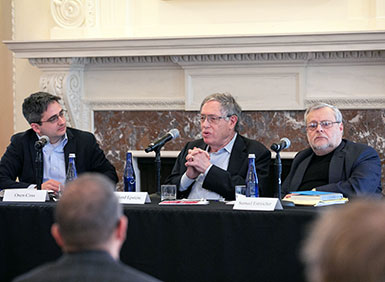Richard Epstein, Samuel Estreicher, and others debate the current state of conservatism
NYU Law’s Classical Liberal Institute (CLI) and the NYU Federalist Society co-hosted a conference, “Reflections on the Revolution in the Heartland: Rethinking Conservatism After 2016,” on March 13.
After an introductory panel on the question, “Does Reaganism still define conservatism?” a second panel addressed the subject “Cost-Benefit Analysis and the Worker.” Laurence A. Tisch Professor of Law Richard Epstein, director of CLI; Dwight D. Opperman Professor of Law Samuel Estreicher, director of NYU Law’s Center for Labor and Employment Law; and Oren Cass, a senior fellow at the Manhattan Institute for Policy Research, debated the efficacy of various labor regulations, the concept of worker reallocation, the pros and cons of unions, and other contentious topics.
Select quotes from the panel:
Oren Cass: “As we evaluate policy, it’s not really sufficient to say that there is an economic pie of GDP and any policy that makes the pie bigger is a good policy and any policy that makes the pie smaller is a bad policy, because we’re not really measuring the right pie, we don’t know what’s going to make it bigger and smaller over time, and people aren’t indifferent to who actually gets to participate in baking it. So in the regulatory context I always encourage the idea of thinking about the task more as a dial than as a dartboard, that all regulatory policy decisions are about tradeoffs, and at the end of the day you’re trying to assess whether you’ve gone too far in one direction or the other and need to move back the other way.”
Richard Epstein: “There are two ways to try to help workers. One of them is a fool’s errand, and the other one, I think, has a lot of prospects. The fool’s errand is…worker retraining programs, programs for people displaced by foreign competition…. Subsidies cost money, they impose deadweight losses on everybody else, they always get hijacked along the way by some political movement…. The advantage of the yellow-dog contract [an employer-worker contract in which the employee agrees not to join a union] is [that] you get more people into markets, you reduce the barriers to entry, that creates more employers and it creates more employees, and you start the thing moving up.”
“The most important thing you can do is simply get out of the way. These guys are much smarter about running their businesses than you are.”
Samuel Estreicher: “There is no democracy in the world that does not have an independent labor movement. China, in my view, could use an independent labor movement. You can’t have a functioning democracy if people are treated like pawns where they work. It may be that unions need to be reconfigured…. They play an important role in making sure that some of the rewards of joint effort go to the workers, and for that you need some muscle, because the employer is not going to share that.”
Posted April 23, 2019


